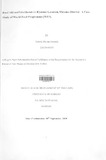| dc.description.abstract | Food aid discourse is of interest and controversial development aid. It is a particularly topical
and relevant issue of development concern in the Kenyan context where food shortages have
become a regular occurrence. This study focused on livelihoods of recipients of food aid by
assessing whether project food aid had made a difference on their households. The major
objective of the study therefore was to determine the extent to which food aid led to
improvement of livelihoods of households or increased their dependency thus leading to
chronic poverty.
Primary data was collected through a survey with the use of questionnaires, key informants
interviews, and observation. The study was conducted between May 2009 to November 2009.
The data collection was confined to household beneficiaries and key informants in Kyatune
location, Mutomo District. Secondary data was derived mainly from journals, library books,
newspapers, internet and World Food Programme (WFP) project documents especially report
evaluations. Data analysis was done by both qualitative and quantitative techniques.
The findings and discussions on the role of food aid in the improvement of livelihoods
established that WFP food aid through school feeding programme, maternal child health and
food for work have to a large extent helped the households meet their basic necessities, albeit
without making them food-self sufficiency. With regard to the relationship between food aid
and persistent poverty, it was established that a strong correlation existed between the two as
households that received food aid seemed to be trapped in persistent poverty. From the
findings of the study, it was concluded that WFP food aid plays a key role in the
improvement of livelihoods in communities. With regard to the main objective for the study,
there was overwhelming evidence that it had made significant improvement of households
livelihoods by enabling them to meet their basic needs, especially by addressing the most
important human needs such as food, education and health. There was, however no
signi ficant proof that food aid increased dependence among the households as they made an
effort to produce their own food. However, the harsh climatic conditions and lack of large
scale irrigation deterred progress in ensuring food self-sufficiency. The study therefore
recommends that WFP food aid should continue to focus and intensify its programmes in
education, health, food, and employment aspects since they largely sustain livelihoods of the
households trapped in persistent poverty. Further, there is need for large scale irrigation
projects to ensure food self sufficiency. Also, training and education especially for children in
schools should be continued and strengthened. | en |

